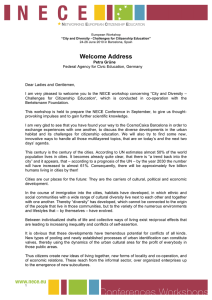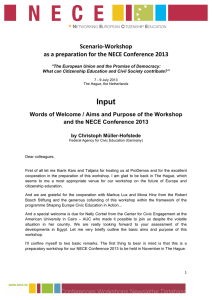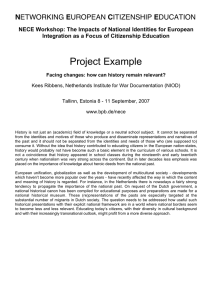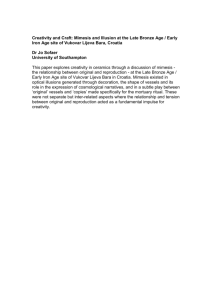Document 11540264
advertisement
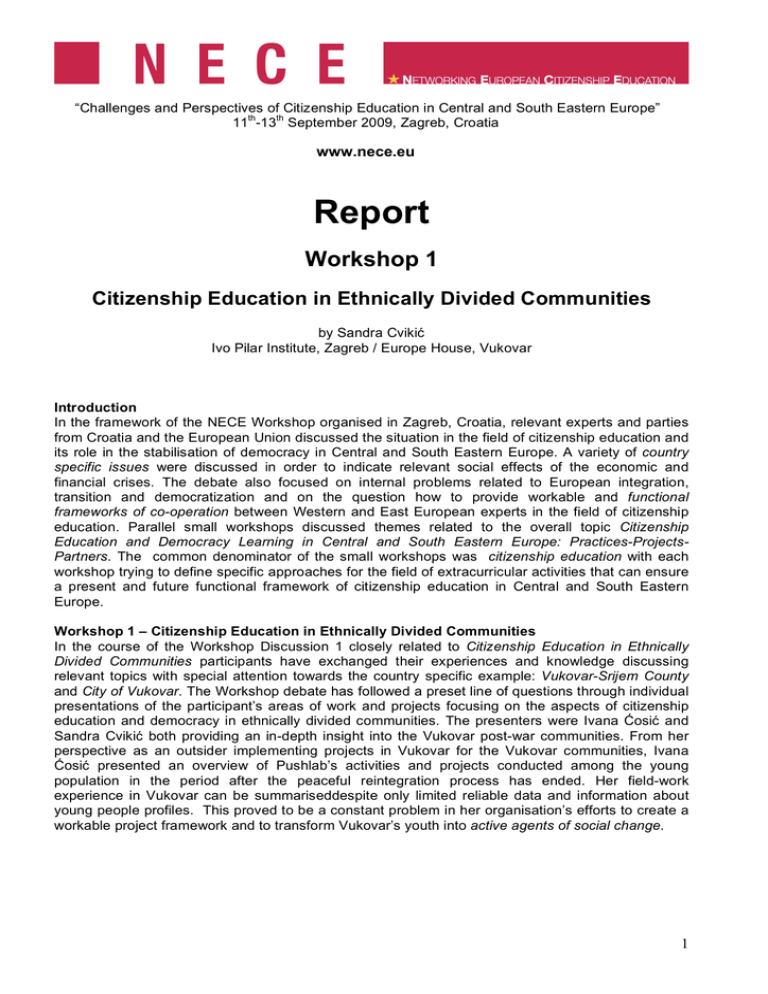
“Challenges and Perspectives of Citizenship Education in Central and South Eastern Europe” 11th-13th September 2009, Zagreb, Croatia www.nece.eu Report Workshop 1 Citizenship Education in Ethnically Divided Communities by Sandra Cvikić Ivo Pilar Institute, Zagreb / Europe House, Vukovar Introduction In the framework of the NECE Workshop organised in Zagreb, Croatia, relevant experts and parties from Croatia and the European Union discussed the situation in the field of citizenship education and its role in the stabilisation of democracy in Central and South Eastern Europe. A variety of country specific issues were discussed in order to indicate relevant social effects of the economic and financial crises. The debate also focused on internal problems related to European integration, transition and democratization and on the question how to provide workable and functional frameworks of co-operation between Western and East European experts in the field of citizenship education. Parallel small workshops discussed themes related to the overall topic Citizenship Education and Democracy Learning in Central and South Eastern Europe: Practices-ProjectsPartners. The common denominator of the small workshops was citizenship education with each workshop trying to define specific approaches for the field of extracurricular activities that can ensure a present and future functional framework of citizenship education in Central and South Eastern Europe. Workshop 1 – Citizenship Education in Ethnically Divided Communities In the course of the Workshop Discussion 1 closely related to Citizenship Education in Ethnically Divided Communities participants have exchanged their experiences and knowledge discussing relevant topics with special attention towards the country specific example: Vukovar-Srijem County and City of Vukovar. The Workshop debate has followed a preset line of questions through individual presentations of the participant’s areas of work and projects focusing on the aspects of citizenship education and democracy in ethnically divided communities. The presenters were Ivana Ćosić and Sandra Cvikić both providing an in-depth insight into the Vukovar post-war communities. From her perspective as an outsider implementing projects in Vukovar for the Vukovar communities, Ivana Ćosić presented an overview of Pushlab’s activities and projects conducted among the young population in the period after the peaceful reintegration process has ended. Her field-work experience in Vukovar can be summariseddespite only limited reliable data and information about young people profiles. This proved to be a constant problem in her organisation’s efforts to create a workable project framework and to transform Vukovar’s youth into active agents of social change. 1 “Challenges and Perspectives of Citizenship Education in Central and South Eastern Europe” 11th-13th September 2009, Zagreb, Croatia www.nece.eu From her perspective as an insider implementing projects and conducting scientific research in Vukovar, Sandra Cvikić has outlined key questions that are essential for the understanding of current ethnic issues in the Vukovar community: • What kind of impact did the Process of Peaceful Integration of Eastern Slavonia have on local communities? • How relevant is the Croatian Constitutional Law on National Minority Rights in relation to the educational system? • Are divided communities perpetuated by the positive discrimination laws on national minority rights or multi-ethnic policies? In her efforts to summarise relevant issues that adequately represent the current social condition of Vukovar’s divided community, Sandra Cvikić has indicated the role of national minorities in the institutional framework of local government authorities and public organisations’ development in recent years. In her conclusion she emphasised the relevance of multicultural policies and multiethnic experiences of the Vukovar community that has become monopolised by the political elites and certain interest groups in recent years, as well. Namely, the law on national minority rights itself has become a tool to create conflicts and a way to bring ethno-cultural political entrepreneurs in power. The discussion was moderated by Caroline Hornstein Tomić. She streamlined the efforts of the participants to outline a common standing on relevant topics and issues based on the two presentations and participants' own knowledge and experiences in their fields of work. In conclusion the following observations, experiences, questions/warnings and recommendations to external/foreign actors in Workshop 1 were formulated: Observations: • • • • • • • • • • • Democracy building – an open ended process (transformation vs. transition); Impact of communist heritage (society, socio-economic and administrative system; rule of law; civil society); Minority rights can lead both to integration as well as to (self-)segregation (under the influence of politics and changes related to it); “Ethnic entrepreneurs” further disintegration; Minority rights are necessary to support the preservation of cultural identity (heritage, language); Interethnic relations do improve under certain conditions (ethnic awareness; responsive/sensitive legal system; administration; economic development and employment); Minority rights are used to enhance public participation (active civic participation); The focus has shifted from peaceful conflict resolution/reconciliation issues to basic needs (health care/improvement, employment, family care, youth and community building); Effects and impacts of displacement experiences on community, development/ reintegration (time loss, passivity); Community disorientation, loss of direction and life control, symptoms of depression are postwar and transition related; Differences are decreased due to positive efforts to overcome relevant issues through work on common goals. Experiences: 2 “Challenges and Perspectives of Citizenship Education in Central and South Eastern Europe” 11th-13th September 2009, Zagreb, Croatia www.nece.eu • • • • • • • • • Going through and overcoming crisis situations as a source of learning; Encouragement to talk and initiate a dialogue about pain and war related experiences, feelings of loss; Mutual learning process to express and accept different “truths” about recent past events, as well as to develop tolerance, empathy and understanding of “other”; Important and necessary to address and engage teachers in civic education/learning process; Motivation and active civic participation in order to show that change is possible and necessary (small scale projects) to oppose passivity and dissatisfaction/constant; complaints; Real change is possible and can be reached by young and committed people. Joint efforts of diversified groups engaged around common issues and goals as a precondition to establish dialogue, communication, and cooperation; Joint engagement and common efforts focused around projects of public/community interests (neglected public places; local environment care and maintenance); “Being different is good!” – focus on a positive approach to diversity and difference as an advantage rather than disadvantage (to bare in mind the negative approach within public policies of differences and appointed minority group public functions?). Questions/Warnings: • • Has civic engagement really increased? To what extent should minority rights be enacted in the public sphere? (“ethno-cultural political entrepreneurship”; institutional/public use of minority language) Recommendations to external/foreign actors: • • • • Forthcoming projects should focus on young people/youth as part of the larger community of civic actors within the system of the state. Country specific in-depth and extensive knowledge required, mandatory for foreign actors when providing a service/support/expertise to local/regional communities; Knowledge acquisition and management through continuous investment in research and data collection, development of a memory politics for specific institutions; Integration of development perspectives by transnational project cooperation; Investment in local knowledge development. In order to summarise the above-mentioned findings of Workshop 1 and after its presentation by Caroline Hornstein Tomić on the last day of the conference, it can be concluded as follows: 3 “Challenges and Perspectives of Citizenship Education in Central and South Eastern Europe” 11th-13th September 2009, Zagreb, Croatia www.nece.eu CONCLUSION (Dealing with ethnic diversity as a special challenge for citizenship education) Relevant Issues Segregation vs. integration/assimilation Democratic deficit Education/training deficit Accessability and social inclusion Centre vs. periphery EU integration Civic identity and multicultural policy development and implementation Recommendations Research and development Education and training Development and implementation of measures to integrate minorities Development of structures, methods to integrate minorities Project creation and implementation In conclusion, a number of different scientific approaches and insights as well as practical aspects were discussed by the participants from different countries in Central and South Eastern Europe. Multipliers and recommendations were introduced, providing valuable insights into inter-ethnic solutions for divided communities of the region. 4

